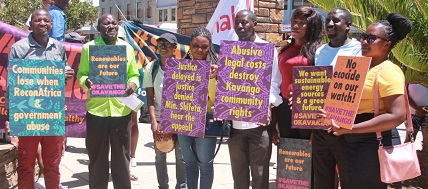
Court costs can ruin conservancies and community forests – Kavango communities call for assistance to waive legal costs

By Jaenique Swartz.
Namibia Civil Society Organisations and Kavango communities are calling on the government to waive legal costs billed to communities who are appealing against ReconAfrica’s permits for further drilling on their communal lands.
In a statement availed to the Economist last week, it is stated that the taxation master will decide on 16 May whether local communities in the Kavango regions must pay up to N$520,757 in government and other legal fees after the court rejected their July 2022 request for urgent action to prevent Canadian company ReconAfrica from continuing to drill for oil and gas on community-managed land.
Communities in the region have since appealed against the actions of the company stating that they were never adequately consulted nor had they given permission to the company for their doings.
As a result, they appealed to the Minister of Environment and Tourism to withdraw permission for further drilling activities on their lands.
The Legal Assistance Centre then represented the community organisations at the High Court in an application to have their appeal to the ministry heard urgently. After the ruling went against them the LAC received a bill of costs in respect of NAMCOR on behalf of the Government Attorney and notification of Taxation for another Bill drawn in respect of Reconnaissance Energy Africa (Namibia).
The chairperson of the Muduva Nyangana Communal Conservancy, Max Muyemburuko said that the government and courts must protect the interests of the people, instead of punishing the communities for exercising their constitutional right to stand against unfair treatment.
“We will stand firm for our democratic right to protect our environment. Kavango is the only land we have: we speak for the trees that do not have a mouth; we speak for the river that does not have a tongue. We have an unfinished task to conserve the environment for our children, grandchildren, and all future generations. This is the very purpose of conservancies and community forests,” he expressed
According to Muyemburuko, this cost order from ReconAfrica’s partner NAMCOR is being done to intimidate Kavango organisations and communities and to deter them from taking further legal action.
A report done by Sproule, the global energy consulting and advisory states that ReconAfrica had a less than 4% chance of finding a commercial resource when they came to Namibia. Multiple geologists only refer to the entity’s exploration as an “investment scam”.
The report further showcases that the company had deceived investors and the Namibian population without any evidence to back up the discovery of a previously unexplored basin containing 120 billion barrels of shale gas. They spent millions of US dollars to promote this finding, but it simply ceases to exist. Currently, insiders within the company have sold their shares netting them hundreds of millions of Namibian dollars, their partner, NAMCOR has followed suit, selling half of their stake. This decision brings forth the notion that both entities are aware the shares will soon value null as no commercial oil or any basin has been discovered in the region to date.
Muyemburuko said the court costs can financially ruin the conservancies and community forests set up by the state to protect the environment in the Kavango region.
“The imposition of costs on these communities by NAMOCR and ReconAfrica cannot be justified in any way as being in the national interest. All court cost orders imposed on Kavango communities for standing up to ReconAfrica must be withdrawn,” he concluded.











































